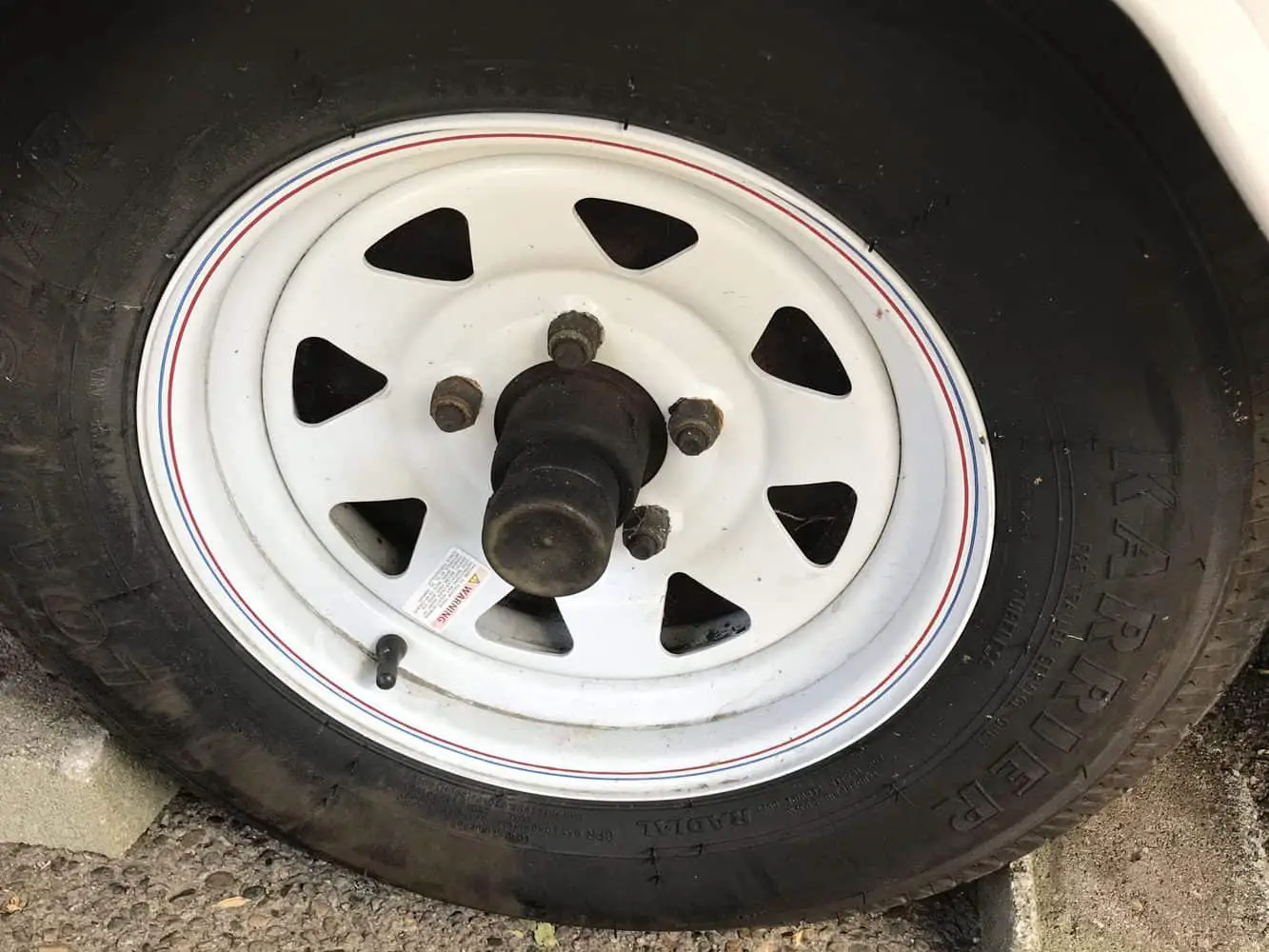Importance Of Trailer Brakes
When you’re towing a heavy load, acceleration is not much of a concern, but rather slowing down to a stop or trying to avoid a mishap in front of you is much more important. You have a lot of weight and inertia that would be very difficult for your tow vehicle to manage on its own. This is why having good properly working travel trailer brakes is so important.
State Laws
According to rvia.org most states require brakes on trailers weighing 3,000 lbs or more. Some states may vary from this, but 3000 lbs seem to be pretty standard among the states. So, if you’re planning on purchasing a new travel trailer that is over 3000lbs or more, you will most likely have either an electric or surge brake system on the trailer.
Different Types Of Travel Trailer Brakes
Electric Brakes
Electric brakes are constructed with electronic components and a set of magnets that apply pressure to a wheel hub. This is controlled by a module that is located in the tow vehicle and is applied as you are pressing on the vehicle’s brake. This connection is made with a trailer harness that will be connected to the tow vehicle.
Brake Controller – The brake controller is the device located in your vehicle near the driver that will control the brakes electronically. Some vehicles will come equipped with the controller from the factory or they will need to be added from a third party manufacturer.
The brake controllers sensitivity can be changed helping your particular trailer slow down at a nice steady pace instead of locking up the brakes.
Also, the brake controller will unusually have a slider or button that can be applied by hand instead of the foot brake.
You may think whey in the world would you use that instead of applying the vehicle brakes?
Well, when I’m personally going down the road and notice my trailer swaying a bit, I will quickly apply the trailer brake to take the sway out (I call it taking the sway out). Others will use it as they are going down a hill and don’t wish to hit the vehicle brake.
The key thing here is to apply it quickly and not aggressively.
Surge Brakes
Surge brakes…or sometimes referred to as “inertia brakes”, are controlled by the push and pull of the vehicle.
This engages the master cylinder that creates pressure in the brake lines by the use of fluid and puts pressure on the trailer drums or rotors depending on the trailer.
These brakes are typically found on lighter trailers and popular on pop up campers where electric brakes are not necessary.
Breakaway Brake Systems (Emergency Systems)
This is a system that automatically brakes your travel trailer if it ever detaches going down the road. The cable is attached to the tow vehicle from the travel trailer tongue area and will pull a pin if it detaches and apply the brakes on the trailer bringing it to a stop.
That’s the theory but as trailers age, this cable and pin can corrode and needs to be inspected regularly to ensure it will work properly if ever needed.
Brake Maintenance
- Electric Brakes- This setup has more parts that need to be inspected and maintained to ensure they are working at optimum capacity. You should check to see if any of your wheels are locking up which can sometimes happen if a magnet is not calibrated correctly and is pressing on the drum too tightly.
- Surge Brakes– This setup relies on the fluid that is pushed in the brake lines and will need to be checked to ensure that there is enough fluid in the reservoir and that there are no leaks that may be slowly leaking. If you find a leak from the lines or from the coupler, you should repair or replace the part and make sure to top off the fluid after the repair is made.
Brake Inspection: Key Signs That Your Travel Trailer Brakes Need Service
Regular brake inspections can help you identify potential issues before they become more significant problems. Be on the lookout for these key signs that your travel trailer brakes may need service:
- Squeaking or grinding noises: These sounds may indicate worn brake pads or shoes.
- Reduced braking performance: If your trailer takes longer to stop, the brakes may need attention.
- Vibration or pulsation: These sensations may be caused by warped rotors or drums.
- Brake warning light: This dashboard indicator signals a potential issue with your brake system.
Replacing Brake Pads and Shoes: A Step-by-Step Guide for Travel Trailer Brake Service
When your travel trailer’s brake pads or shoes wear down, it’s essential to replace them promptly. Follow these steps for a successful brake service:
- Raise the trailer: Use a jack to lift the trailer, supporting it with jack stands.
- Remove the wheel: Unscrew the lug nuts and remove the wheel, exposing the brake assembly.
- Remove the old brake pads or shoes: Follow the manufacturer’s instructions to remove the worn components.
- Install the new brake pads or shoes: Position the new components according to the manufacturer’s guidelines.
- Reassemble the brake assembly: Reinstall the caliper or drum, ensuring all components are properly aligned.
- Replace the wheel: Reattach the wheel and tighten the lug nuts securely.
Servicing Brake Rotors and Drums: Tips for Prolonging
To extend the lifespan of your travel trailer’s brake rotors and drums, follow these tips:
- Inspect for wear: Regularly check the condition of your rotors and drums, looking for signs of warping, grooves, or cracks.
- Resurface or replace: If your rotors or drums show signs of wear, have them resurfaced or replaced as needed to maintain optimal braking performance.
- Avoid overheating: Overheating can cause damage to your brake components. To prevent this, avoid overloading your trailer and maintain a safe following distance to reduce frequent hard braking.
How Long Do Electric Trailer Brakes Last?
Since this brake system uses magnets to put pressure on the wheels, these will eventually wear out. The average life expectancy of brakes can vary based on load, brand, and other factors.
Every 3000 miles you should inspect the performance of the brake and if you feel like they are not performing as they once were, you should take it into a shop and have them do an inspection. You want to be proactive here and not wait until you have a catastrophic failure while on the road.
Can I Tow A Trailer With Electric Brakes Without A Brake Controller?
You can tow a travel trailer that is equipped with electric brakes without a brake controller. The brakes will not engage without the power from the controller so you do not have to be concerned about the brake system locking up on you.
But I have to say that it is not advised to do this because of safety concerns.
I hope this article was helpful and as always…
Good luck and happy camping.
Check out our article on: Can You Ride In A Travel Trailer? (State Guide Included)

